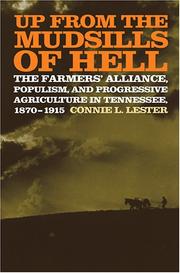| Listing 1 - 10 of 19 | << page >> |
Sort by
|
Book
ISBN: 1315008378 1136280995 0415178126 9780415178129 9781136280993 9781315008370 9781136281068 9781136281136 9780415864220 1136281061 Year: 1998 Publisher: London Routledge
Abstract | Keywords | Export | Availability | Bookmark
 Loading...
Loading...Choose an application
- Reference Manager
- EndNote
- RefWorks (Direct export to RefWorks)
First published in 1998
Book
ISBN: 146964200X 9781469642000 0913239631 9780913239636 0913239682 9780913239681 Year: 2017 Publisher: Appalachian State University
Abstract | Keywords | Export | Availability | Bookmark
 Loading...
Loading...Choose an application
- Reference Manager
- EndNote
- RefWorks (Direct export to RefWorks)
This biography explores the life of James G. K. McClure, Jr., and his vision for a better life in the mountains of North Carolina. At his prompting, and under his leadership, The Farmers Federation was founded in Fairview, North Carolina, in 1920.
Agriculture, Cooperative --- History. --- McClure, James Gore King. --- Agricultural cooperation --- Agricultural cooperatives --- Cooperative agriculture --- Cooperative societies, Agricultural --- Farmers' cooperatives --- Agricultural contracts --- Cooperation --- McClure, James G. K. --- McClure, Jim,
Book
ISBN: 1501762133 Year: 2022 Publisher: Ithaca : Cornell University Press,
Abstract | Keywords | Export | Availability | Bookmark
 Loading...
Loading...Choose an application
- Reference Manager
- EndNote
- RefWorks (Direct export to RefWorks)
"This book explains variations in institutional change within Japan Agricultural Cooperatives in the context of deepening demographic pressures and shifting market incentives"--
Book
ISBN: 1315007002 1136242414 0415176190 9781136242410 9781315007007 Year: 1998 Publisher: London Routledge
Abstract | Keywords | Export | Availability | Bookmark
 Loading...
Loading...Choose an application
- Reference Manager
- EndNote
- RefWorks (Direct export to RefWorks)
First Published in 1998. Routledge is an imprint of Taylor & Francis, an informa company.
Communism. --- Agriculture, Cooperative. --- Agricultural cooperation --- Agricultural cooperatives --- Cooperative agriculture --- Cooperative societies, Agricultural --- Farmers' cooperatives --- Agricultural contracts --- Cooperation --- Bolshevism --- Communist movements --- Leninism --- Maoism --- Marxism --- Trotskyism --- Collectivism --- Totalitarianism --- Post-communism --- Socialism --- Village communities

ISBN: 080786711X 9780807867112 0807824216 0807847313 9780807824214 9780807847312 0807824216 9780807824214 9798890870087 Year: 1998 Publisher: Chapel Hill London
Abstract | Keywords | Export | Availability | Bookmark
 Loading...
Loading...Choose an application
- Reference Manager
- EndNote
- RefWorks (Direct export to RefWorks)
Americans have always regarded farming as a special calling, one imbued with the Jeffersonian values of individualism and self- sufficiency. As Victoria Saker Woeste demonstrates, farming's cultural image continued to shape Americans' expectations of rural society long after industrialization radically transformed the business of agriculture. Even as farmers enthusiastically embraced cooperative marketing to create unprecedented industry- wide monopolies and control prices, they claimed they were simply preserving their traditional place in society. In fact, the new legal form of cooperation far outpaced judicial and legislative developments at both the state and federal levels, resulting in a legal and political struggle to redefine the place of agriculture in the industrial market. Woeste shows that farmers were adept at both borrowing such legal forms as the corporate trust for their own purposes and obtaining legislative recognition of the new cooperative style. In the process, however, the first rule of capitalism--every person for him- or herself--trumped the traditional principle of cooperation. After 1922, state and federal law wholly endorsed cooperation's new form. Indeed, says Woeste, because of its corporate roots, this model of cooperation fit so neatly with the regulatory paradigms of the first half of the twentieth century that it became an essential policy of the modern administrative state.
Agriculture, Cooperative --- Raisin industry --- Agricultural cooperation --- Agricultural cooperatives --- Cooperative agriculture --- Cooperative societies, Agricultural --- Farmers' cooperatives --- Agricultural contracts --- Cooperation --- Law and legislation --- History. --- California Associated Raisin Company. --- Sun Maid Growers of California --- CARC
Book
ISBN: 2271063043 227112820X 9782271128201 Year: 2020 Publisher: Paris : CNRS Éditions,
Abstract | Keywords | Export | Availability | Bookmark
 Loading...
Loading...Choose an application
- Reference Manager
- EndNote
- RefWorks (Direct export to RefWorks)
La construction d’une « économie de marché » constitue le critère essentiel du processus d’élargissement de l’Europe. Mais qu’entend-on au juste par « marché » ? Peut-on le comprendre autrement que comme un schéma idéal qui transforme les pays candidats en élèves plus ou moins appliqués, mais toujours fautifs ? Et quelle est l’importance du « marché » dans les transformations que traversent les pays de l’Europe de l’Est ? En se fondant sur une enquête de terrain au plus près des pratiques, des représentations et des valeurs des villageois roumains, Sabina Stan montre que la transformation postsocialiste de l’agriculture coopérative ne renoue pas avec son passé « paysan ». Elle s’inscrit dans la continuité des rapports de force qui l’ont structurée durant les dernières décennies du régime socialiste. Au sein de ces rapports de pouvoir, les cadres agricoles occupent une place essentielle, même si l’agriculture coopérative reste soumise aux contraintes du gouvernement, des propriétaires terriens ou de la situation fluctuante de l’agriculture roumaine dans l’économie mondiale. Attentive aux usages sociaux ou familiaux, aux négociations pour le travail ou aux reconfigurations internes au village qu’entraînent les nouvelles mesures de politique nationale, l’auteur établit la nécessité de comprendre de l’intérieur les processus sociaux qui sous-tendent les marchés économiques plutôt que d’appliquer des catégories générales.
Agriculture, Cooperative --- Agriculture --- Agriculture and state --- Coopératives agricoles --- Politique agricole --- Social aspects --- Aspect social --- Coopératives agricoles --- Farming --- Husbandry --- Industrial arts --- Life sciences --- Food supply --- Land use, Rural --- Agricultural cooperation --- Agricultural cooperatives --- Cooperative agriculture --- Cooperative societies, Agricultural --- Farmers' cooperatives --- Agricultural contracts --- Cooperation --- économie --- étude de cas --- agriculture --- Roumanie --- POLITIQUE AGRICOLE --- POLITIQUE ECONOMIQUE --- ROUMANIE --- Politique économique --- Politique économique
Book
ISBN: 9027978492 311080638X 9783110806380 020290038X 9780202900384 9789027978493 Year: 1976 Publisher: The Hague Chicago Mouton Distributed by Aldine
Abstract | Keywords | Export | Availability | Bookmark
 Loading...
Loading...Choose an application
- Reference Manager
- EndNote
- RefWorks (Direct export to RefWorks)
No detailed description available for "Popular Participation in Social Change".
Cooperation --- Cooperative societies --- Agriculture, Cooperative --- Collective settlements --- Social Sciences and Humanities. Development Studies -- Rural Development --- ALLW. --- Social change --- Communal settlements --- Communistic settlements --- Communism --- Socialism --- Collective farms --- Communal living --- Agricultural cooperation --- Agricultural cooperatives --- Cooperative agriculture --- Cooperative societies, Agricultural --- Farmers' cooperatives --- Agricultural contracts --- Agriculture --- Coopération --- Pays en voie de développement --- Cooperation - Congresses --- Cooperative societies - Congresses --- Agriculture, Cooperative - Congresses --- Collective settlements - Congresses --- Participation
Book
ISBN: 1280823739 9786610823734 0803206372 9780803206373 9780803207455 080320745X 1280823852 9786610823857 0803299761 Year: 2007 Publisher: Lincoln University of Nebraska Press
Abstract | Keywords | Export | Availability | Bookmark
 Loading...
Loading...Choose an application
- Reference Manager
- EndNote
- RefWorks (Direct export to RefWorks)
A master of driving pace, exotic setting, and complex plotting, Harold Lamb was one of Robert E. Howard's favorite writers. Here at last is every pulse-pounding, action-packed story of Lamb's greatest hero, Khlit the Cossack, the "wolf of the steppes.
Agriculture, Cooperative --- Agricultural cooperation --- Agricultural cooperatives --- Cooperative agriculture --- Cooperative societies, Agricultural --- Farmers' cooperatives --- Agricultural contracts --- Cooperation --- E-books --- Adventure stories. --- Cossacks. --- Cossacks -- Fiction. --- Historical fiction. --- Steppes. --- Cossacks --- Steppes --- American Literature --- English --- Languages & Literatures --- Grasslands --- Cozacks --- Kozaks --- Ethnology --- Asia, Central --- History --- Central Asia --- Soviet Central Asia --- Tūrān --- Turkestan --- West Turkestan --- Asia

ISBN: 082032762X 9786612553196 1282553194 0820330809 9780820330808 9780820327624 9781282553194 Year: 2006 Publisher: Athens University of Georgia Press
Abstract | Keywords | Export | Availability | Bookmark
 Loading...
Loading...Choose an application
- Reference Manager
- EndNote
- RefWorks (Direct export to RefWorks)
Up from the Mudsills of Hell analyzes agrarian activism in Tennessee from the 1870s to 1915 within the context of farmers' lives, community institutions, and familial and communal networks. Locating the origins of the agrarian movements in the state's late antebellum and post-Civil War farm economy, Connie Lester traces the development of rural reform from the cooperative efforts of the Grange, the Agricultural Wheel, and the Farmers' Alliance through the insurgency of the People's Party and the emerging rural bureaucracy of the Cooperative Extension Service and the Tennessee Department of Agriculture. Lester ties together a rich and often contradictory history of cooperativism, prohibition, disfranchisement, labor conflicts, and third-party politics to show that Tennessee agrarianism was more complex and threatening to the established political and economic order than previously recognized. As farmers reached across gender, racial, and political boundaries to create a mass movement, they shifted the ground under the monoliths of southern life. Once the Democratic Party had destroyed the insurgency, farmers responded in both traditional and progressive ways. Some turned inward, focusing on a localism that promoted-sometimes through violence-rigid adherence to established social boundaries. Others, however, organized into the Farmers' Union, whose membership infiltrated the Tennessee Department of Agriculture and the Cooperative Extension Service. Acting through these bureaucracies, Tennessee agrarian leaders exerted an important influence over the development of agricultural legislation for the twentieth century. Up from the Mudsills of Hell not only provides an important reassessment of agrarian reform and radicalism in Tennessee, but also links this Upper South state into the broader sweep of southern and American farm movements emerging in the late nineteenth century.
HISTORY --- General --- Agriculture --- Agriculture, Cooperative --- Populism --- Economic aspects --- National Farmers' Alliance and Industrial Union. --- Agricultural cooperation --- Agricultural cooperatives --- Cooperative agriculture --- Cooperative societies, Agricultural --- Farmers' cooperatives --- Farming --- Husbandry --- Farmers' Alliance (U.S.) --- Southern Farmers' Alliance (U.S.) --- N.F.A. and I.U. --- NFA and IU --- Political science --- Agricultural contracts --- Cooperation --- Industrial arts --- Life sciences --- Food supply --- Land use, Rural --- Farmers' and Laborers' Union of America --- E-books
Book
ISBN: 0816541728 0816534748 0816536295 9780816541720 Year: 2017 Publisher: University of Arizona Press
Abstract | Keywords | Export | Availability | Bookmark
 Loading...
Loading...Choose an application
- Reference Manager
- EndNote
- RefWorks (Direct export to RefWorks)
"Provides a cross-country comparison of smallholder agricultural cooperatives in Paraguay, Brazil and Colombia, revealing immense opportunities and challenges for community development, empowerment, and social change"--Provided by publisher.
Rural development --- Agriculture, Cooperative --- Agricultural cooperation --- Agricultural cooperatives --- Cooperative agriculture --- Cooperative societies, Agricultural --- Farmers' cooperatives --- Agricultural contracts --- Cooperation --- Community development, Rural --- Development, Rural --- Integrated rural development --- Regional development --- Rehabilitation, Rural --- Rural community development --- Rural economic development --- Agriculture and state --- Community development --- Economic development --- Regional planning --- Citizen participation --- Social aspects --- Social Science --- Agriculture & Food (see Also Political Science --- Public Policy --- Agriculture & Food Policy) --- Anthropology --- Cultural & Social
| Listing 1 - 10 of 19 | << page >> |
Sort by
|

 Search
Search Feedback
Feedback About UniCat
About UniCat  Help
Help News
News